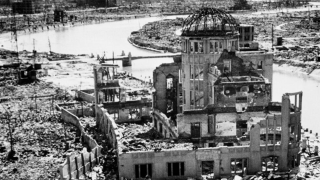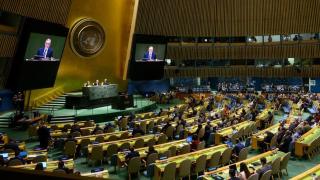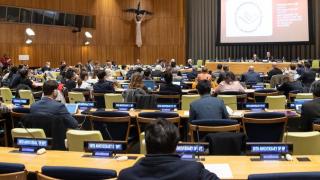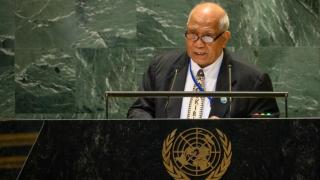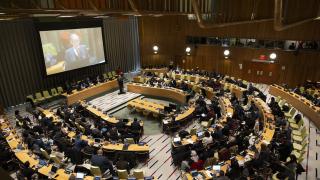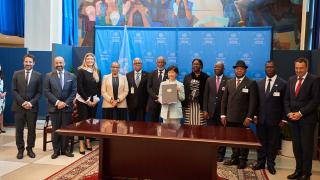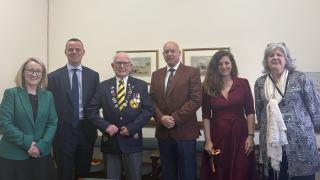
On 2 April, UNA-UK - in partnership with the Human Rights APPG -, hosted an impactful session to discuss the lasting effects of British nuclear testing in the Pacific. Chaired by Rebecca Long Bailey MP, who has long campaigned on these issues, the briefing provided a critical platform for those directly affected by these tests to share their stories with parliamentarians and explore ways to seek accountability.
The session included powerful testimonies from Brian Unthank, a nuclear veteran who witnessed the nuclear explosions firsthand as part of Operation Grapple; Oli Troen, a Senior Associate at McCue Jury and Partners which advocate for victims rights; and Kaitama Toroto, a community leader from Kiritimati Island, a region deeply affected by British nuclear testing. Together, they highlighted the devastating and ongoing impact of the nuclear tests, calling for the UK government to take responsibility and address these historical wrongs.
The discussion concerned a pressing issue that has been overlooked for far too long - the far-reaching consequences of Britain’s nuclear tests on both veterans and the local communities exposed to radiation in Kiribati. These tests, carried out in the 1950s and 1960s on Kiritimati Island and other Pacific locations, have caused severe health problems, environmental damage, and generational trauma. What makes this issue even more urgent is the sheer number of people still impacted by the tests - over 155,000 living descendants of nuclear veterans, whose lives have been shaped by the fallout, and the indigenous populations living in Kiribati who continue to experience repercussions to this day. Despite overwhelming evidence, and concerns raised by Parliamentarians from across the political spectrum, several of whom have affected constituents, the UK government has yet to provide adequate support or compensation, leaving many to face lifelong struggles without recognition. The scale of the problem is enormous, and the need for action is critical as the number of those affected continues to grow.
Brian Unthank delivered a deeply personal and moving account of his experience as a young serviceman exposed to three nuclear detonations. He vividly described his postings to Kiritimati, where he witnessed the raw, terrifying power of the bombs: “there was a white flash - an intensity of light I still cannot fully describe,” Brian recalled. His story not only highlighted the immediate health consequences but also the long-term genetic damage affecting his children and grandchildren. “These are the disabilities happening with our descendants predicted to last in the families for around 500 years,” he said, leaving a stark reminder of the devastating legacy of nuclear testing. Brian’s testimony also exposed the ongoing struggles veterans face, including the difficulty in accessing their medical records, which have been kept from them for decades.
Oli Troen provided a broader, legal perspective on the issue, emphasising the sheer scale of the problem and the growing number of people affected: “the scale is huge, and this issue isn’t going away”. He stressed that while veterans are not seeking legal retribution, they are demanding accountability and action from the UK government. Oli stated, “The Ministry of Defence (MoD) has fought the veterans and indigenous communities at every step of the way.” He shared remarks on a proposed solution, which would include a special tribunal with the power to compel witnesses and gather evidence to confirm the extent of the damage. This tribunal could be a stepping stone toward ensuring the veterans and their descendants receive the justice they deserve.
Kaitama Toroto added an emotional and urgent plea from Kiritimati Island, where the effects of nuclear testing still impact communities. "There has been no clear support, no acknowledgment from the UK government since the testing," Kaitama shared. He revealed how, for decades, islanders have suffered in silence, with their voices suppressed by colonial powers and ignored by the British government. “Our elders should not be left to carry this burden alone,” stressing that the issue is not just about righting historical wrongs but about ensuring fairness for the future. "The time has come to tell this part of history - not just for their families but for all of us," he added, imploring the UK government to take responsibility and compensate the people of Kiribati.
The session concluded with a strong call to action, emphasising the need for immediate and comprehensive government intervention. Rebecca reiterated the urgency of a full investigation into the medical records of veterans and their descendants, pushing for a transparent and thorough review of the historical files. Suggestions also included use of various parliamentary channels to raise awareness and demand accountability for communities affected by the UK’s nuclear testing and related lasting impacts.
The event marked a significant step forward in the fight for justice and recognition for those impacted by the UK’s nuclear tests. With powerful testimonies, clear proposals, and a united call for action, the session highlighted both the human cost of these tests and the urgent need for accountability. As the number of people affected continues to grow, it is clear that this issue cannot be ignored any longer. The time for action is now, and with the support of Parliament, there is hope that this historical injustice will finally be addressed, bringing long-overdue justice and healing to those who have suffered for far too long.
Read more:
- UNA-UK’s interview with Ambassador Tito, Kiribati Ambassador to the United Nations
- UNA-UK’s overview of the outcomes of the 3MSP to the TPNW
- UNA-UK's briefing on The Treaty on the Prohibition of Nuclear Weapons
Photo: L-R: Rebecca Long Bailey MP, Oli Troen, Brian Unthank, Cameron Thomas MP, Sophie Radice, Nicole Piche

